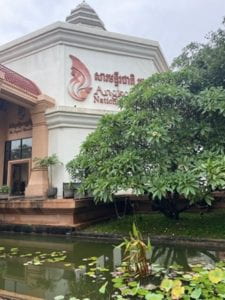
On Day 9 of our program, we visited two incredibly interesting sites: the Angkor National Museum in Siem Reap and the Angkor Conservation center (which is a non-public site for the professional conservation of damaged cultural heritage materials).
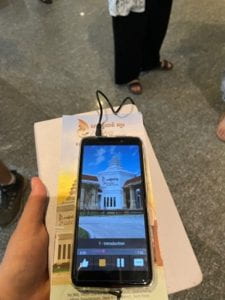
After our usual breakfast at the Hotel, our first stop includes visiting the Angkor National Museum. At the museum, we were given self-guided audio devices (complete with audio explanations and matching headphones!) to allow us to walk freely among the exhibits and larger galleries. The audio tour was able to provide us with the flexible of returning to certain galleries or sections of the museum that interested us the most!
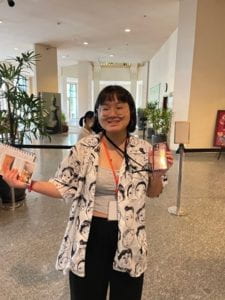 First, the audio guide provides historical context and an introduction to the layout of the Angkor National Museum. The group was able to investigate the different galleries and exhibits of pre-Angkorian and Angkorian time periods.
First, the audio guide provides historical context and an introduction to the layout of the Angkor National Museum. The group was able to investigate the different galleries and exhibits of pre-Angkorian and Angkorian time periods.
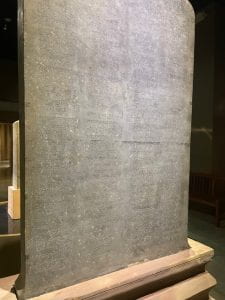 The exhibits also included explanations of the origin of the Kingdom of Cambodia and Angkor. My favorite exhibits included the time period of different art styles in Angkor, especially the lintel pieces. I was also incredibly fascinated by the stone inscription gallery. The organization of the exhibit and showcases were beautifully designed and intricate, as well as the actual stone inscriptions!
The exhibits also included explanations of the origin of the Kingdom of Cambodia and Angkor. My favorite exhibits included the time period of different art styles in Angkor, especially the lintel pieces. I was also incredibly fascinated by the stone inscription gallery. The organization of the exhibit and showcases were beautifully designed and intricate, as well as the actual stone inscriptions!
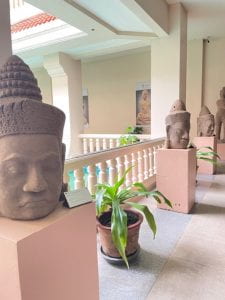
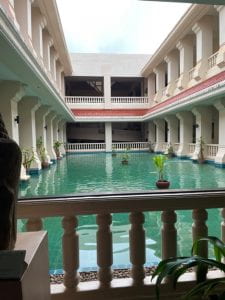
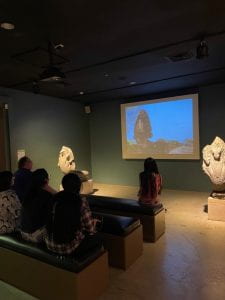 At the Museum, there were also numerous film and multimedia content for visitors to engage with—this is a picture of our students listening in on the history of Naga statues at Angkor Thom. The museum also showcased an intricate miniature version of Angkor Wat.
At the Museum, there were also numerous film and multimedia content for visitors to engage with—this is a picture of our students listening in on the history of Naga statues at Angkor Thom. The museum also showcased an intricate miniature version of Angkor Wat. 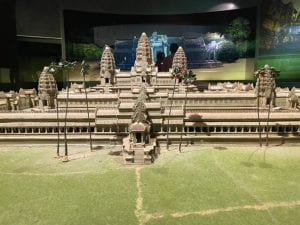
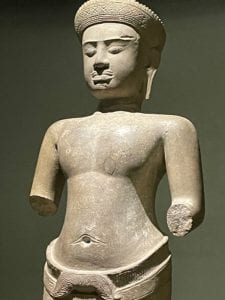 Throughout the Museum, there were several galleries and exhibits touching upon the religious beliefs that influenced much of Angkorian time.
Throughout the Museum, there were several galleries and exhibits touching upon the religious beliefs that influenced much of Angkorian time. 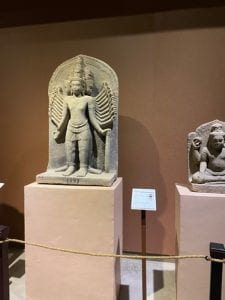 Here are some of the religious statues of Buddha, Vishnu and Shiva.
Here are some of the religious statues of Buddha, Vishnu and Shiva.
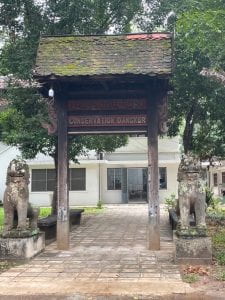 On our last stop of the day, the group also visited the Angkor Conservation center to learn about the repatriation and restoration efforts of the Cambodian team to restore stolen/looted artifacts from Angkorian antiquity. The group was asked to not take pictures in order to safeguard the center, but the presentation and lecturer of Angkor Conservation were incredibly insightful into the history of looting within the temples we visited as well as the modern, relevant issues that the Conservation and Museums within Cambodia face today in their repatriation efforts. The picture below shows the entrance of the Angkor Conservation!
On our last stop of the day, the group also visited the Angkor Conservation center to learn about the repatriation and restoration efforts of the Cambodian team to restore stolen/looted artifacts from Angkorian antiquity. The group was asked to not take pictures in order to safeguard the center, but the presentation and lecturer of Angkor Conservation were incredibly insightful into the history of looting within the temples we visited as well as the modern, relevant issues that the Conservation and Museums within Cambodia face today in their repatriation efforts. The picture below shows the entrance of the Angkor Conservation!